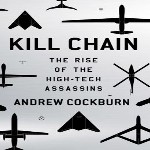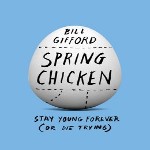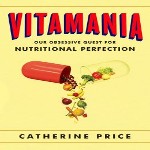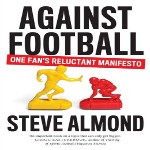APRIL 2015
AUDIO BOOK REVIEWS
by Jonathan Lowe
 |
If we're still not sure what human
morality consists of, asks the author of KILL
CHAIN, (a Harpers magazine reporter,) how
will we be able to determine what morality a robotic
drone may possess once it becomes autonomous? The
audiobook, which is subtitled The Rise of
the High Tech Assassins, traces the history
of what led to the present state of clandestine war.
Obama decided to wage "smart" war after
Bush played it dumb (and expensive), using stealth,
spying, and drones. But there has been limited success,
and even more budget deficits as the Pentagon plays
the President and the taxpayers, asking for hundreds
of billions to finance new computers, training facilities,
weapons, jets, technologies, bases, ships, and an
entire "kill chain" of operators, intelligence
analysts and officers charged with the impossible
duty of keeping America 100% "safe." The
results have been spotty, with a terrorized general
public in places like Pakistan and Yemen, where civilian
casualties to drone strikes can come at any time.
Imagine being a citizen of Yemen, aware that just
talking to the wrong person can get you killed, not
just by terrorists but by a missile fired from an
unseen Predator--as one bus of pedestrians, including
women and children, was when a "Hellfire"
missile targeted a nearby car. Why care about this?
Because the locals started thinking of themselves
as victims of America...and terrorist sympathizers.
War is messy, and "military intelligence"
an oxymoron when the enemy starts getting smart, and
uses Twitter while hiding and disguising. This audiobook,
narrated by the always engaging Malcolm Hillgartner,
attempts to put some perspective on the complexity
of the problem.
|
|
 |
Bill Gifford in SPRING CHICKEN
talks about (through narrator Jeremy Arthur)
the effectiveness of vitamins and other substances
or modalities in staying young forever (obviously
an impossible goal except via uploading one's brain
into a computer.) Not only has the anti-oxidant theory
of aging been disproven, but calorie restriction,
resveratrol, and other things have limited effects.
Having researched this subject for my suspense novel
The Methuselah Gene, I found this audiobook interesting
and informative, with a broad, memoir style approach
that includes many personal stories as the author
recalls his encounters with both scientists and pseudo-scientists.
He ends with a list of things that may help advance
age by preventing major diseases, but the ultimate
pill is still science fiction (although they are working
on it!) And just as my protagionist speculates how
people might react to overpopulation and extended
lifespans of the rich, who can afford such pills,
he presents his case for moderation and wary skepticism. |
|
 |
VITAMANIA by Catherine Price
bears the subtitle "Our Obsessive Quest for Nutritional
Perfection," and comes at a time when Wal Mart
and other retailers have gotten into trouble for selling
vitamins that do not contain what the label says they
do. The FDA decided not to regulate the billion dollar
industry, limiting warnings to overdoses of A or D.
So, when Adele Davis and Linus Pauling encouraged megadoses
of vitamins, the lid was off for companies to make fortunes
off gullible people who spent money they (mostly) could
have better spent on natural foods with micronutrients
in them which the supplements do not contain. Just as
the processed (junk) food industry can't make money
from people who eat whole foods, so too the same processed
food industry gets more profits by extracting (if not
artifically producing) vitamins from grains and other
foods, and repackaging those vitamins to consumers.
Do we need vitamins? Of course, and many foods are deficient
in vitamins. But is the solution to eat poor quality
foods and supplement them with pills? Price argues no,
since one becomes the pawn of charlatans who are unregulated
and tend to make claims which are unproven, working
off fear and ignorance. Rather than to buy expensive
vitamin pills in a myriad range of confusing formulations
(whose prices fluctuate according to popular fads),
it is better to find out if there are deficiencies in
one's diet through one's doctor, and eat better quality
food in a wider range. Price, through the guidance of
talented narrator Erin Bennett, tells
why knowing the facts matter. Listening to this book
may save you thousands of dollars over time, while protecting
your health in the process. |
|
 |
Finally, Steve Almond grew
up in a fighting family. Fist fights among his brothers
were as natural as breathing. He says he made up for
it vicariously by watching Raiders games, where giant
men either symbolically (or in reality) broke their
opponents into bone fragments. He reveled in the violence
which scientists now say genetically thrusts 4% of young
men into hardened criminal adulthood, and another 25%
into borderline (mild to actual) aggressive sociopathy.
As a mature writer, author of AGAINST FOOTBALL,
he still appreciates the attraction to football, but
questions some of the uncomfortable realities which
have made it America's sport. The game almost didn't
survive early problems as a hazing ritual, described
as two lines of human battering rams, seen as war complete
with land and air assaults. But Roosevelt stood up for
it, citing it as "manly," somewhat like the
Spartans, who forced their children to fight with swords
or die. (Spartans is a popular name for young teams
today.) Ever since football began to take advantage
of its battle narrative "story" structure
and make money, promoters and organizers like the NFL
have done everything they can to keep the myth alive
that it is good and "wholesome" fun...even
as they dismiss accusations to the contrary (or bribe
officials to stay silent.) Truth is, pro players live,
on average, ten years less than non-players. And there
are other tolls not calculated in concussions or other
injuries. The "glorious triviality" that is
football consumes large chunks of public attention that
cannot be spent elsewhere, like fixing the problems
that we create faster than anyone can solve. It makes
our culture, like that of ancient Rome, accepting of
the idea that one must choose sides in all debates,
and beat the opposition by brute force of will (rather
than reason.) We have made football so important, Almond
says, because we are bewildered by the complexity of
politics and greed and corruption, but we understand
the matchups between teams that stand in for an imperfect
and violent world. We want simple answers that feel
good, have definitive outcomes, and provide the resolution
that life seldom does (except in novels.) Narrated
by an always engaging and "manly" Peter Berkrot,
the book is a wakeup call to a society that is okay
with punishing whistleblowers and encouraging voyeurism
in a time when activism, meaning and truth are in short
supply. |
|
| From the author, regarding my own book
audiobook The Umpire Has No Clothes: Diary of a
Sports Atheist (which is satire that includes fiction):
"I love it! You deserve credit as a major theologian
of our age! I agree that sports are radical religions.
In this sense, America has become a kind of pan-theistic
culture: we worship many Gods. And we all believe that
our God is the only pure one. I think that serious fans
(of football or any other sport) long to feel the sense
of dominion and power that comes with victory over another
clan. And I think this need to feel like a winner (even
if by proxy) is exaggerated in a hyper-capitalist culture
because we're constantly made to feel like losers who
are falling behind. But there are lots of other reasons
people love football. Because it re-connects us to the
intuitive physical pleasures of childhood. Because it's
incredibly satisfying drama. Because it's a chance to
see athletic greatness on display, etc." |
|
|